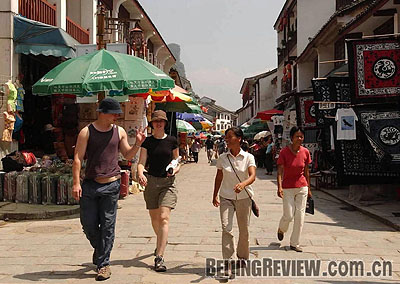By Ashley Brown
|

|
|
Bargaining with enthusiastic street merchants is all part of the experience of a trip to Yangshuo's popular Xijie commercial street. |
Anyone who's been in China for more than five minutes knows that bargaining is a very prominent part of the Chinese culture. But nowhere is this more striking than in a tourist-oriented location, and especially during its holiday season. Take Yangshuo for instance. It is a stunningly beautiful little county 20 km from Guilin in Guangxi Zhuang Autonomous Region, a place that I was lucky enough to spend a week in over the recent summer holidays.
Part of the charm of Yangshuo is the almost constant offers of products and services, and, of course, the inevitable bargaining that goes with it once you express interest in something. It's fairly common knowledge that anything without a price tag is fair game for a haggle--and in Yangshuo, almost nothing has a price tag.
Having said that, if you know what you're doing, and if you know approximately what you should be paying for a given item or service, you can get right into the spirit. Check out some of these figures--a hat I bought went from 30 yuan ($1=6.85 yuan) to 10 yuan; a pack of postcards went from 15 yuan to 5 yuan and even a haircut dropped from 40 yuan to 20 yuan. Excursions are not exempt from bargaining, as I found out when I eventually paid 60 yuan for a day trip to some nearby caves from the original 90 yuan offered. Even more drastic was the cost of the hotel space... with the indispensable help of some local contacts; I was able to get the hotel from 218 yuan a night to just 70 yuan. Talk about a discount!
Everywhere you went, there was someone trying to sell you something, sometimes making a beeline for you and often surprisingly good flogging off anything from boat trips, bicycle rentals and various souvenirs and trinkets.
A ride on a bamboo boat down one very busy part of the river was interrupted by shouts from vendors on their floating kiosks. Yells of "Hello water! Hello beer!" were prolific as soon as they spotted a foreigner floating toward them. At a couple of points during this two-hour trip, the boat went down a slight slope, rather surprising those on board (because our feet get very wet very quickly)... and the second surprise was that there were people in a floating photography lab 30 meters downstream who had just taken a photo of our surprised expressions and wanted money for it. Almost poetically unscrupulous.
Every so often you'd also see these old guys with these giant cormorants, sometimes sporting a sign (in English) saying "5 yuan for a photo with me or me and my birds." Thing is, as touristy as you look by doing it, you do give the guy your fiver, because he and his birds look so damn cool.
One of the most surprising moments for me, however, was when we stopped at one of Yangshuo's most visited destinations, Moon Hill. It was a 45-minute climb up to a rather spectacular view of the region's famous karst mountains. The moment we arrived at the foot of this mountain, three or four old ladies greeted us with foam kiosks slung over their shoulders, offering us all sorts of liquid treats--all in English. And the more we saw of these women, the more I realized that their English was really good! I live in Wuhan, Hubei Province, a city with extremely little, almost no, English spoken by the older generation. And yet here were these old Chinese ladies having decent conversations with the foreigners up and down the mountain. After being in Wuhan for two years, it was like seeing a red Ace of Spades. So, of course, I ended up giving them some business.
For many of the vendors I bought goods from in Yangshuo during my week there, people like me provide a major source of their annual income, and I'm sure that for a few people and businesses there, tourists (local and foreign) provide their sole source of income. And during the summer holidays in Yangshuo, it's open season on all of us. But that's part of this culture and part of Yangshuo's charm.
(Beijing Review November 20, 3008)